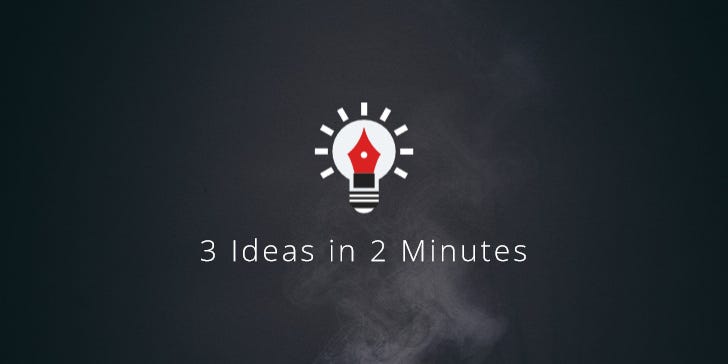#157: Maslow's Hammer, Inductive Reasoning & the Law of the Holes
3 Ideas in 2 Minutes on Misguided Problem-Solving
Many thanks to everyone who is now supporting me on Patreon. You can join for free or become a paid member for as little as $3 per month. Paid members already have access to sneak peeks such as my next essay on the Diderot Effect and my updated reading list.
I. Maslow's Hammer
Excellent problem-solvers are adaptable and have lots of different tools at their disposal. Poor problem-solvers, however, are limited in mind and ability. This is famously encapsulated in the following adage attributed to American psychologist Abraham Maslow:
If the only tool you have is a hammer, it is tempting to treat everything as if it were a nail.
—Abraham Maslow, The Psychology of Science
II. Inductive Reasoning
Inductive Reasoning is the bottom-up approach of formulating generalisations and broad conclusions from specific observations. It’s a type of reasoning fictional detective Sherlock Holmes is known for. In Arthur Conan Doyle’s first novel, A Study in Scarlet, Holmes notices a few details about Dr Watson’s appearance and demeanour and concludes that he must’ve served as a military doctor in Afghanistan.
The problem with Inductive Reasoning is its uncertainty and unreliability. We need a lot of data to extrapolate to a general conclusion. Dr Watson has a distinct type of mud on his sleeve; mud not found in London. Everyone who has this type of soil on their sleeve was in Afghanistan. Therefore, Watson served in Afghanistan. …doesn’t work on its own because there could be numerous reasons why Watson’s sleeve is muddied with mud from east of the Middle East.
III. Law of the Holes
The Law of the Holes is a witty metaphor we’ve all encountered at one point or another:
If you find yourself in a hole, stop digging.
You said something foolish and are now trying to justify said foolishness with more foolish words. You’re running an experiment that keeps failing and you keep repeating it over and over hoping for a different outcome, wasting valuable time and resources. It’s obvious, but I’m going to spell it out anyway: If you find that an action you’re taking is making a problem worse, it’s prudent to stop what you’re doing and think it over.
That being said, only a few people know the Second Law of the Hole:
When you stop digging, you’re still in a hole.
Meaning, following the first Law of the Holes, you’ve only accomplished not making things worse. Now the hard part of getting to the root of the problem begins. May I suggest looking into Structured Analytic Techniques? 🐘
Have a great week,
Chris
themindcollection.com
P.S.: I took the opportunity and made some design changes. Hope you like the new look.


